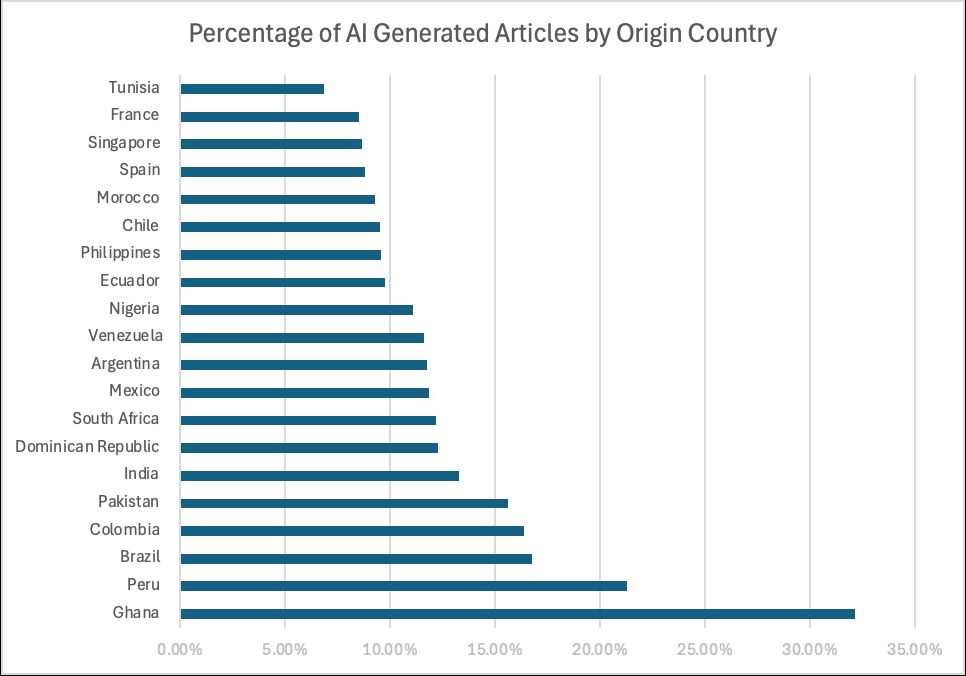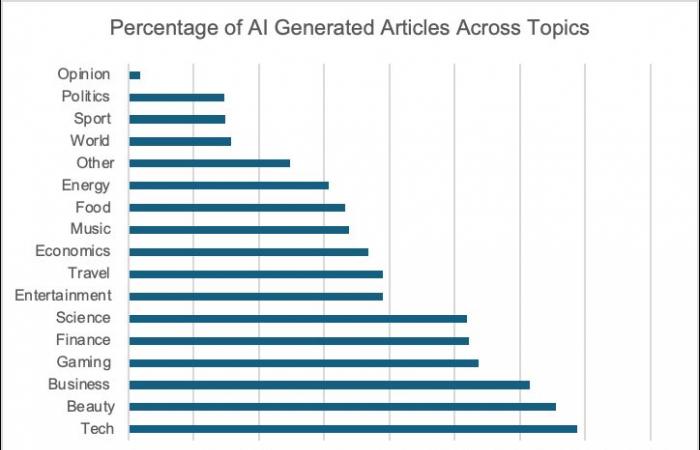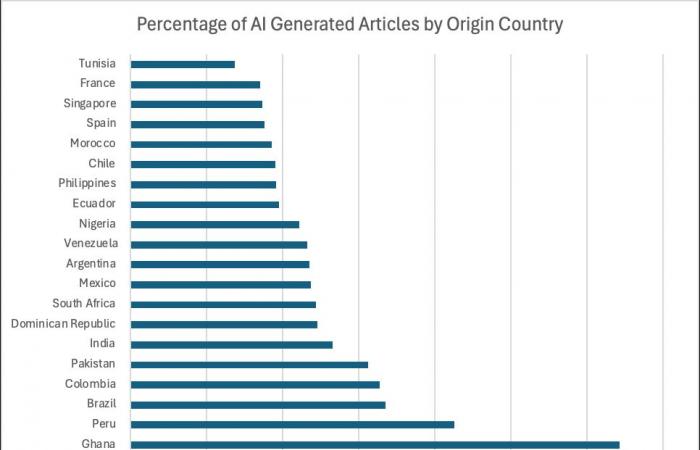Originally, slop refers to the pile of sludge which gradually lines the bottom of the tanks of ships, particularly oil tankers, wrote Courrier International last June. The term has also been used for several months to designate low-end content generated by AI and which is increasingly flooding the web.
Not content with polluting Amazon Books and Youtube (up to and including the philosophy channels, Mr. Phi recently noted), the slop would also invade the Medium blogging platform. WIRED says in fact that it asked the company Pangram Labs, specializing in the detection of artificial intelligence, to analyze a sample of 274,466 recent articles, published over a period of six weeks on the platform.
The start-up, which presents its technology as “ most accurate for detecting AI-generated content at scale ”, with an accuracy rate of “ more than 99.98% ”, estimated that more than 47% of them were likely generated by AI (GenAI).
WIRED asked a second start-up, also dedicated to detecting GenAI content, Originality AI, to compare two samples of Medium posts, one dating from 2018, the other from this year. 3.4% of the first had probably been generated by AI.
A percentage which corresponds to the company's false positive rate, specifies its CEO, John Gillham, especially since AI tools were not yet widely used. Conversely, just over 40% of the 2024 sample was probably generated by AI.
7% of news articles are generated by AI
« That's two orders of magnitude more than what I see on the rest of the internet “, Max Spero, CEO of Pangram, tells WIRED. In August, the start-up had indeed analyzed 857,43 articles published on 26,675 information websites on a single day last July, and discovered that 59,653 of them, or 6.96%, had been, in whole or in part (50 to 100%), written by AI.
Ghana topped the list of countries using AI the most, with almost 33% of GenAI articles, followed by Peru (more than 20%), Brazil, Colombia and Pakistan (16%). If France (8%) came in penultimate position in the ranking, just behind Singapore and Spain, the latter mainly mentioned countries in South America, West Africa and South Asia, and no other European or North American country.
Tech came at the top of the themes most polluted by GenAI content, ahead of beauty (due to sponsored articles), business, gaming, finance and science, particularly in relation to scams linked to crypto-assets.

Putaclics calls for ads and crypto scams
Pangram had identified several types of GenAI articles. Some only aim to fulfill “ sites designed for advertising » (made-for-advertising sites, or MFAs) in order to attract readers and expose them to low-end advertisements.
Their contents are therefore not “ not really meant to be read ”, but just to attract customers, via “putaclics” titles in particular. Advertisers are also not aware of displaying their advertisements on these low-end sites. Pangram estimates that MFAs represent approximately 50% of GenAI content.
The company also noted that a “ large part » articles on the theme of beauty were in fact “sponsored”, and therefore written by communicators and editors subcontracting the writing of such content to AIs. Likewise, many instructions for use linked to new crypto-assets turn out to be scams, the writing of which is again outsourced to AI.
78% of articles tagged NFT, web3 and Ethereum were GenAI
On Medium, 4,492 of the 5,712 articles (or 78%) tagged NFT had also probably been generated by AI. A disproportionate proportion that Pangram also observed in articles labeled web3, Ethereum, “AI” and… pets.
McKenzie Sadeghi, an editor at NewsGuard, an online misinformation monitoring company that has identified more than 1,000 GenAI news websites, found that most of this type of content was about cryptoassets. , marketing and search engine optimization (SEO).
The numerous accounts appearing to have published significant volumes of AI-generated documents also appear to only concern a small, if any, readership, notes WIRED. An account reported by Pangram Labs as having written several articles devoted to cryptos had published six of them in just one day, but without any interaction, suggesting a negligible impact.
Conversely, WIRED also found that other articles flagged by Pangram, Originality and AI detection firm Reality Defender as likely AI-generated had hundreds of “claps,” similar to ” likes” that we find on other platforms, but without knowing whether they come from humans or bots.
Medium is made for human storytelling, not GenAI articles
« Medium essentially works thanks to human curation “, retorts Tony Stubblebine, the CEO of the platform, referring to the 9,000 editors-in-chief of Medium publications, as well as the additional human evaluation of articles likely to be artificially “boosted”.
If he recognizes that GenAI content published on Medium “ has probably increased tenfold since the start of the year “, he nevertheless opposes the use of AI detectors to assess the scope of the problem, in part because he believes that they cannot differentiate between messages generated entirely by AI and messages in which AI is used in a lighter manner (which the CEO of Pangram rejects, incidentally).
Unlike LinkedIn and Facebook, which explicitly encourage the use of AI, Medium no longer allows GenAI articles. “ Medium is for human storytelling, not AI-generated writing », Underlined the platform on its blog last year. “ The vast majority of discoverable AI-generated stories in raw feeds for these topics get zero views », Adds Stubblebine.
« As generative AI tools become more commonplace, platforms that give up trying to eliminate bots will incubate an online world in which human-created work becomes increasingly difficult to find on platforms overwhelmed by bots. AI », concludes WIRED, echoing the theory of the dead Internet.
Labeled as a conspiracy theorist, she argues that the Internet is practically populated only by bots and that the majority of content is generated by algorithms, marginalizing human activity.







